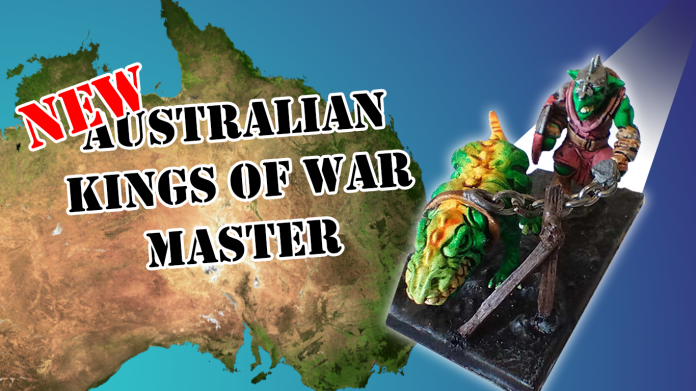G’day Goonhammer readers! The Australian Kings of War Masters concluded a few weeks ago, and by all accounts it was a tight competition. Tough army lists coupled with some of the best players in the country, everyone thought they knew how it would end. Yet, to the surprise of most, it was Stephen Devenish and his very balanced army of Ogres that won out.
The Australian Kings of War Masters was a five-game, 2300 points event. Unlike previous years, the Masters qualification was based on regions of Australia; Queensland, Victoria, New South Wales, Australian Capital Territory and “The Rest” (sorry, South Australia, Northern Territory and Tasmania). From each of these, three of the top players would be drawn, based on their ranking from winning events, and some auto-qualifiers won at certain large tournaments. It’s the first year this is run, but already it seems to have shaken things up a bit.
We got the chance to put to him a few questions about himself and his time at Masters, just to see what kind of person can win such an event!
Cytoplasm: How did you start miniature wargaming?
Stephen: My first foray into tabletop wargaming was with a classmate from uni. He had been playing Warhammer for a while and he set up a small game on his dining table – Vampires vs Brettonians. I loved the themes and the gameplay so after messing around with his armies for a while I took the plunge and started playing Lizardmen.
Cytoplasm: What attracted you to Kings of War?
Stephen: I was looking for a replacement game after the Warhammer world blew up and stumbled on Kings of War via games on Universal Battle (online simulation where you can play almost any tabletop game). Initially, I was unconvinced by the relative simplicity of the game but grew to love the balance between armies and strong emphasis on strategy in each game. It was less about just taking powerful magic users and unbalanced units and more about making units synergise with each other on the table.
Cytoplasm: What armies do you have, and what are you currently working on?
Stephen: I currently have Salamanders (my original WHFB Lizardmen), Kingdoms of Men, Goblins and Ogres. In the last couple of years I have been trying to move to more Mantic armies so this year I have been slowly putting together a new Mantic Salamander army.
Cytoplasm: What’s more important to you, the hobby, or the gaming?
Stephen: While I enjoy parts of the hobby, the game is why I continue with miniature wargaming. I love playing a game where I can refine my strategies, tinker with lists and think outside of the box mid-game. Being able to play with an army that I have put together and painted myself does hold a very unique satisfaction though!
Cytoplasm: What is the Kings of War community like in the Australian Capital Territory? Do many come from nearby New South Wales? Is it very competitive?
Stephen: I’m not sure on the exact number but we have around 15-20 players in the ACT, around 10 will regularly attend local tournaments. We get a lot of travelers each year for Clash of Kings in January but there’s only been a few NSW travelers for the smaller, one day tournaments through the year.
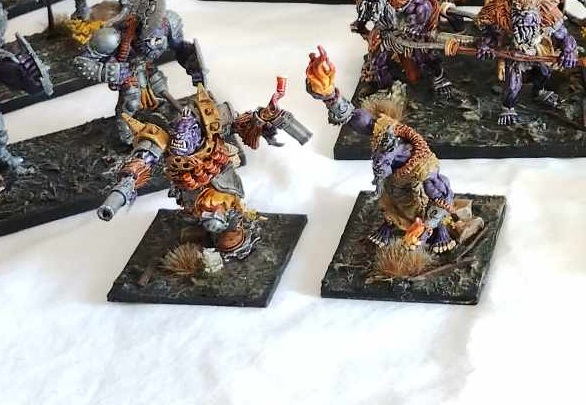
I wouldn’t say the scene is super competitive but we do have a number of good players who each bring their own twist to the game and can challenge anyone on their day.
Cytoplasm: Was this the first Kings of War Masters you attended?
Stephen: This was my second Masters appearance. My first Masters was last year in Melbourne where I took my goblins and finished in fourth overall.
Cytoplasm: How was the Masters event from your perspective? Was it good to have the Rising 2024 event held at the same time?
Stephen: I loved it to be honest. Spreading the Masters over two days was a good move, and I think having the Rising 2024 held concurrently at the same venue worked really well too. I think the Masters committee has done a great job setting up a new format this year and I look forward to seeing how it goes next year.
Cytoplasm: Is there anything you would change about the event? Different format, special rules, or restrictions?
Stephen: One thing I did like in the previous Masters format was the army swap round 1. It forces players to really consider how their list works, and how to make it difficult for an opponent to pilot. Also, Masters is really about rewarding good play – which is more than just finding the strongest list and playing it well.
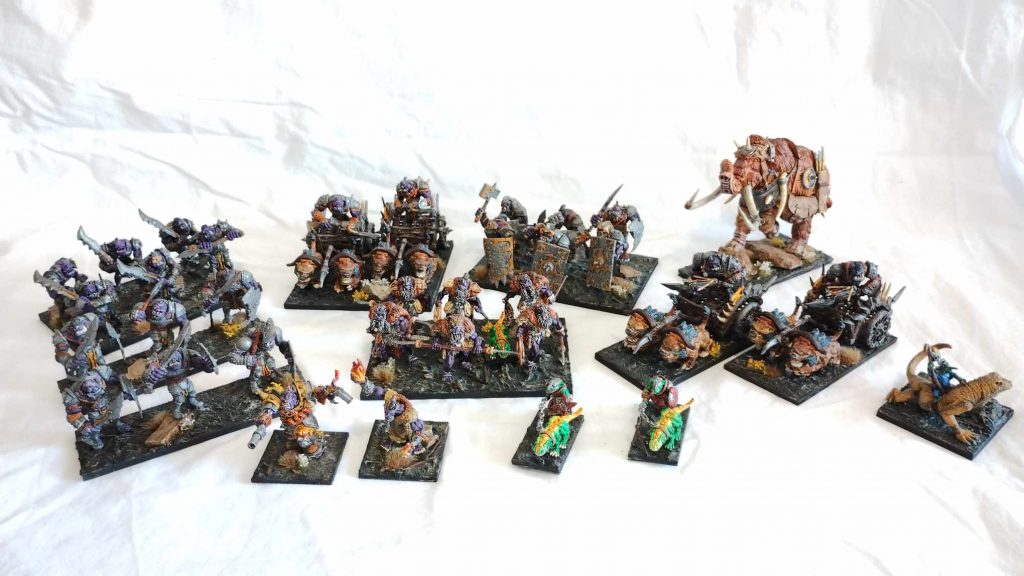
Stephen’s 2300pts of Ogres:
1 x Hunters (horde) – Crocodog, Staying Stone 2 x Warriors (regiment) 1 x Siege Breakers (horde) – Chalice of Wrath 1 x Berserker Braves (horde) – Sir Jesse’s Boots of Striding 1 x Boomer Chariots (troop) 1 x Mammoth – The Big Deal 2 x Crocodog Wranglers 2 x Sergeants – Heavy Crossbow, Chariot Mount 1 x Boomer Sergeant 1 x Nomagarok 1 x Kuzlo & Madfall
Cytoplasm: What made you decide to bring Ogres to Masters?
Stephen: Ogres are my only complete Mantic army and I’ve been mostly playing them this year so I didn’t need to have as many practice games to feel comfortable taking them to Masters. My version of Ogres is also able to be competitive regardless of what I see on the other side of the table, which is valuable over a 5 game tournament.
Cytoplasm: How did you decide on this army list? For an Ogre army, it appears to have an even spread of different unit types, with minimal repeating of units such as the popular Siege Breakers and Warlocks.
Stephen: I’m not really one for repeating units! Part of it is personal preference (I dislike the thought of taking lots of one thing) but by keeping everything slightly different I find it gives me more gameplay options, and also forces my opponent to answer more questions during the game.
The list itself is an evolution from lots of games and finding out what works with my preferred style of play in the long run.
Cytoplasm: How much testing was involved in getting to this final iteration of the list? Did you keep using the same list throughout the year, or has it always been changing with new ideas?
Stephen: Being the incredibly slow painter I am, I only have a few painted units that weren’t on the table to be honest! Baring slight variations, the core of the list has been pretty much the same all year. The biggest change for Masters was to replace a boomer horde with the berserker horde which worked really well during playtesting and during the event.
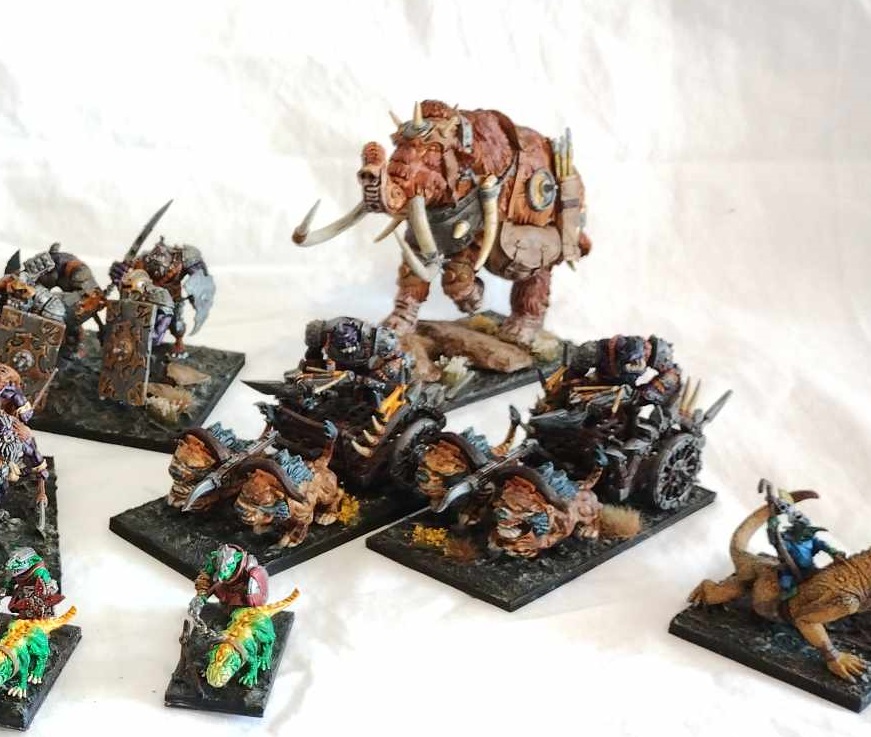
Cytoplasm: Where are all the Warlocks? Were Nomagarok and the Sergeants enough to pressure the enemy?
Stephen: I like to make my lists a bit unique from others. Having played against a lot of warlock heavy lists, I decided early on that I didn’t want my ogres to be warlock heavy and so I built in other tools to make that work.
I also think multiple warlocks – while powerful – have been figured out a bit and do have legitimate weaknesses in that they force their player to bunch up and lose a lot of maneuverability. When playing against warlocks, I have tended to find that good play can neuter them reasonably consistently.
Mounted sergeants with crossbows (credit to Steve Tuck for the idea) are my third favourite entry in the army and are fantastic at being relevant every turn of the game.
Cytoplasm: The Boomer Sergeant is not often seen, how did it fit into the list and why was it useful?
Stephen: While he does have his uses, he would be one of the first units to go if I was to rebuild the list. I did like when he was able to combo fire with the boomer chariots – which was essentially the same shooting as a boomer horde. He is also a decent token caddy as he can pick up a loot token and still be relevant with his 12” shooting. He was also a turn 4-5 chaff piece a few times. If I had a few more points, he would 100% be upgraded to a berserker bully though.
Cytoplasm: Kuzlo & Madfall are famous for being as dangerous to you as they are to the enemy, how did you use their -1 Nerve aura (for everyone!) to your advantage?
Stephen: My favourite unit in the army! Kuzlo is always one of my last drops and he almost always goes on a flank. When I can, I love to pair him on the same side as the Big Deal as -3 nerve before combat even begins can be the difference between getting a rout and just missing it.
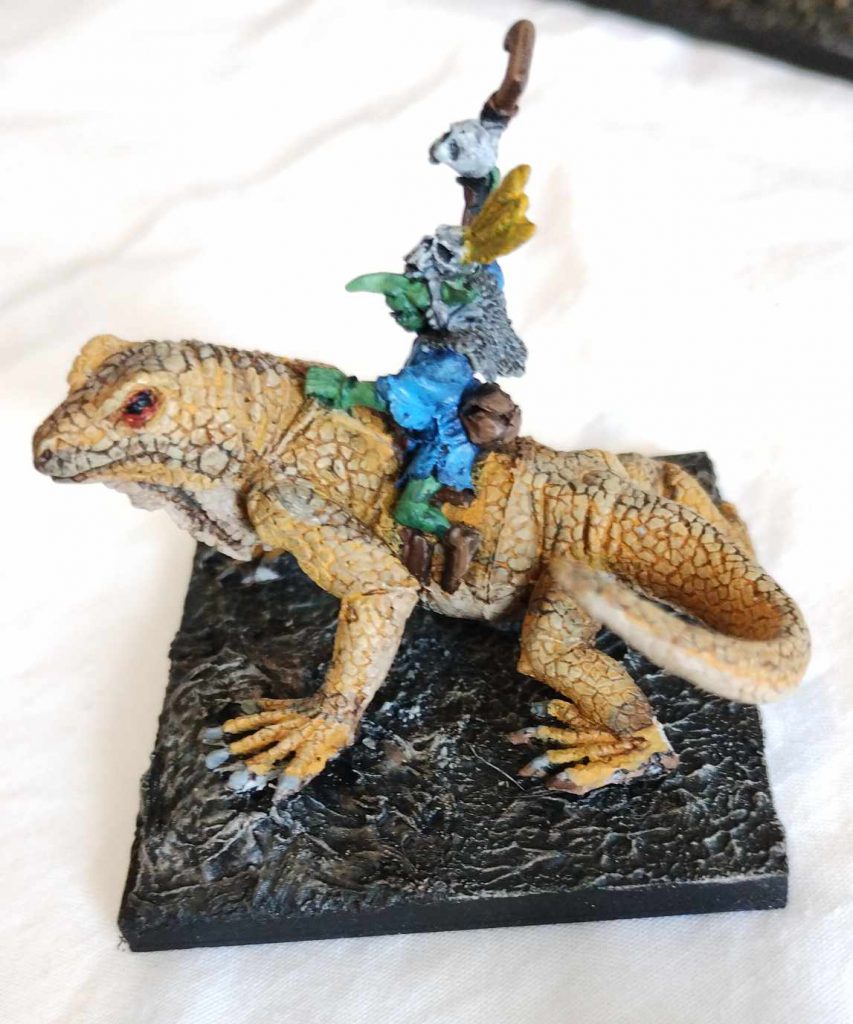
With his pathfinder and nimble speed 8, Kuzlo is very difficult to pin down and is excellent at delaying a fast flank and slowing down more points than he is worth. If he can get behind lines, he almost always causes havoc.
I don’t mind deploying Kuzlo next to my other units – as long as they aren’t getting threatened by too much shooting turn 1! Kuzlo tends to find his own space pretty quickly turn 1 and 2.
Cytoplasm: What kind of shenanigans did the Crocodog Wranglers get up to? Who did they surprise, and when did they save you?
Stephen: At Masters, I don’t think anyone was surprised by them but they were still impactful most games. From memory, they were able to delay a dragon on a flank for a turn, contribute to killing annoying dwarf heroes (with their duelist), shut down sharpshooter troops every turn after turn 3 and save a lot of ogre hordes by holding up second waves in my opponents lists.
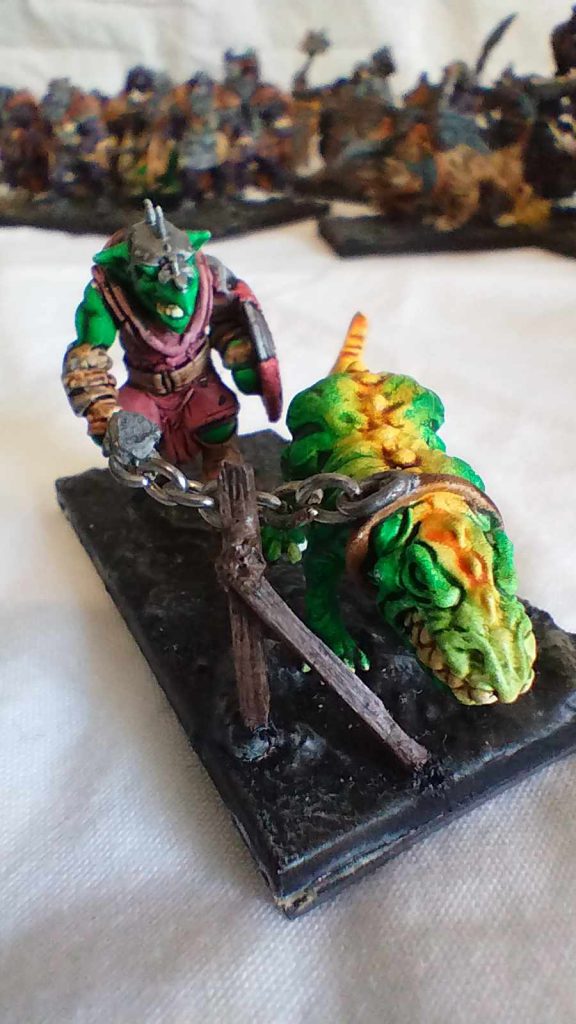
Cytoplasm: In retrospect, is there anything in your army that you would change if you could?
Stephen: The two things are probably the siege breakers (for my style they are a bit expensive although big shield and crushing 2 is nice) and the boomer sergeant. I would probably replace them with a vanilla ogre horde with fury and a berserker bully.
Cytoplasm: What was the hardest army/opponent you played at Masters and why?
Stephen: I feel almost all my games swung both ways at times and a few could have gone the other way if I didn’t win the roll to choose turns or get a bit lucky on the dice. I feel the game I had with Max was pretty intense as we both had a few clutch moments and I think he beat me on attrition too. Getting turn 1 against dwarves stuck in terrain and playing invade all went very much in my favour that game.
Cytoplasm: At what point did you realize you might be winning the Australian Kings of War Masters?
Stephen: After I won the game with Rex and his dwarves I thought I might be in with a chance. I wasn’t sure at that point who my last opponent was going to be so I was mentally preparing to play out a draw if needed. Ogres playing control is one of their better scenarios so I was confident I could at least get a draw if I played for it. As it turned out, I played against Matt Sellick and his elves with only 7 scoring units so it wasn’t the best scenario for him.
Cytoplasm: What is your advice to players starting an Ogre army?
Stephen: Try and borrow some units from a mate and see what you really enjoy about playing ogres. They do a lot of things well such high unit strength lists, mixed arms, warlock magic bombardment, even massed chariots for the crazies out there. I like to pick one or two favourite units and build around them – it means that I’m playing with units I enjoy and that naturally feeds into the gameplay I’m most comfortable with. Kings of War is pretty balanced and you can make most units work if you really want them to so don’t worry about just playing with what everyone else is using.
Cytoplasm: Your spot in next year’s Masters is secure, will you go again?
Stephen: I would love to! There’s no guarantees in life but I think I now owe it to next year’s Masters qualifiers to have the chance to dethrone me in person next year.
Cytoplasm: What’s next hobby-wise? More Ogres or something new?
Stephen: Salamanders. My favourite army from a gameplay perspective and I’ve been slowly painting them up this year. Don’t hold your breath though, I really am slow.
Cytoplasm: Are there any people, clubs or shops you would like to give a shout-out to?
Stephen: For sure! The game is more than hobbying and pushing toys around on a table, it’s a community. So thanks to all the guys at Tony’s shed for being a great community and helping to sharpen the iron, thanks to Matt, Luke and Nick for running the local ACT tournaments this year and thanks also to all those on the Masters committee for putting on a great event this year.
The Australian Masters was a major success, and this new iteration bringing in representation from each of the states of Australia changed up the scene. Stephen Devenish demonstrated that the best Kings of War army is a balanced one, ready to take on anyone and anything. Ogres do this best, and Stephen has been practicing hard enough with them to weather most situations. A big thanks to Stephen for taking the time to answer our questions.
If you want more Australian Masters coverage, be sure to watch Direct Misfire’s streaming of the event, including Stephen’s final game. For even more, the preeminent Kings of War podcast Countercharge interviewed Stephen about Masters and his list building strategies (episode 671).
Have any questions or feedback? Drop us a note in the comments below or email us at contact@goonhammer.com.
